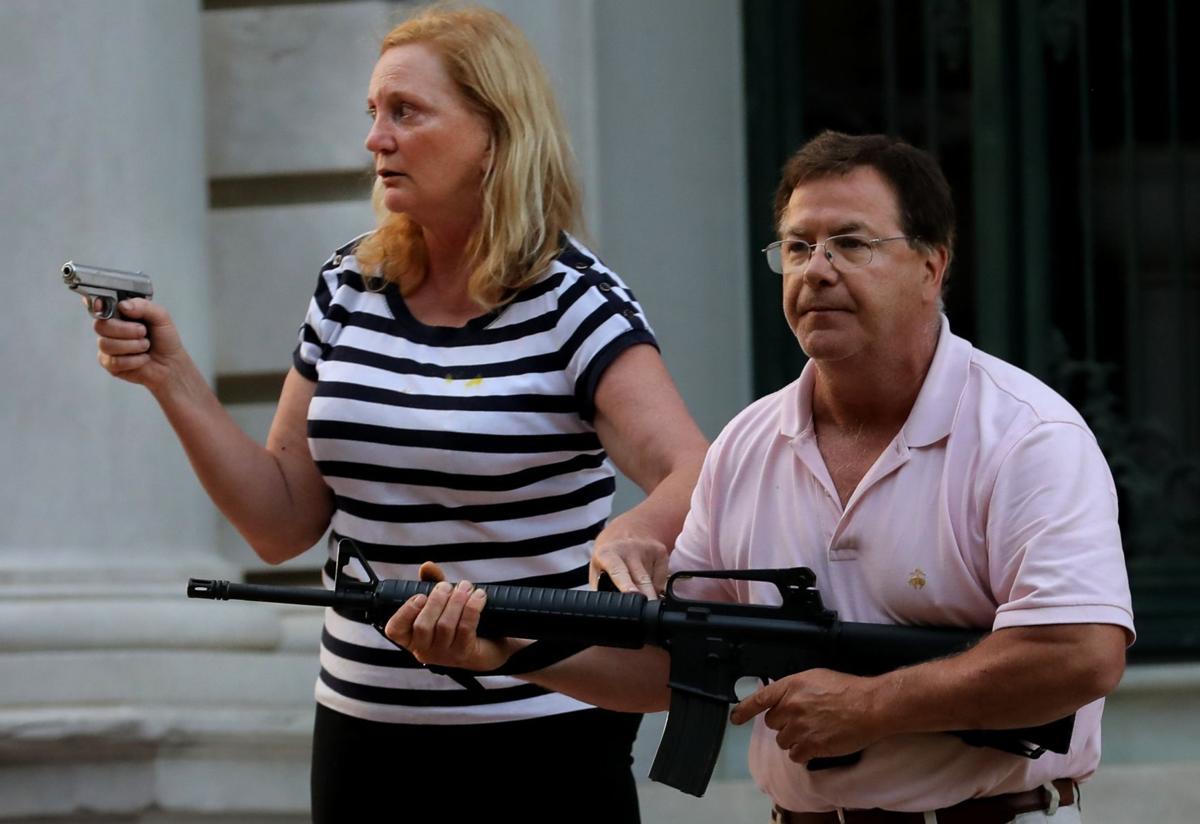There’s a lesson to be learned in the prosecution of Mark and Patricia McCloskey.
But it’s not the one the wealthy white couple from the gated Portland Place subdivision think it is. Last week, the McCloskeys asked a judge to return their case to a grand jury. The couple and their attorney, Joel Schwartz, believe that Circuit Attorney Kimberly M. Gardner tainted the grand jury process when she sought indictments on felony gun charges. The couple famously pointed weapons at protesters who were headed through the neighborhood on the way to former Mayor Lyda Krewson’s house last summer.
People are also reading…
The judge said no. So now, special prosecutor Richard Callahan, who was appointed by a judge to replace Gardner, will decide whether to go forward with the case. For many, the case has become a political Rorschach test. The McCloskeys have become darlings of the Trump crowd, alleging without evidence that the Black Lives Matter protesters were putting their lives in danger. Gardner, who supports elements of the criminal justice reform movement, is praised by her supporters as standing up against the real mob.
Mark and Patricia McCloskeys’ lawyer Joel Schwartz conveys disappointment to the judge’s ruling to deny sending the case back to the grand jury. Video by Hillary Levin
But what interests me about the case, at this point, is the same thing on the mind of the McCloskeys: How they got charged. Here’s what happened: The police were alerted to a possible gun crime. They investigated. They sent a report to the circuit attorney. The circuit attorney filed a complaint against the McCloskeys, charging them with one felony, but she didn’t order them arrested, instead, issuing a summons. About two months later, the grand jury added a second felony charge. The McCloskeys pleaded not guilty.
They never spent a day in jail.
Now they are fighting for an opportunity to face the evidence against them. That puts them in a similar position to hundreds of defendants, most of them Black and poor, being held right now in one of the city’s two jails. Many of those men and women also are facing felony gun charges. But Gardner didn’t give them the same treatment she gave the McCloskeys.
Instead, most people in ºüÀêÊÓƵ who are arrested by felony complaint are arrested immediately, and, if bail is set, and they can’t afford it, they are jailed. The Missouri Supreme Court says that those people deserve a preliminary hearing within 30 days in order to face the charges against them. Most of them don’t get it. They end up in the Medium Security Institution, also called the workhouse, or the Criminal Justice Center, for months, without an opportunity to face the charges against them, because Gardner and her assistants tell associate circuit court judges that they intend to issue grand jury indictments, as happened in the McCloskey case. And the judges, all too often, do not hold prosecutors accountable to the rules, choosing to favor incarceration over due process.
ºüÀêÊÓƵ columnists Aisha Sultan and Tony Messenger discuss the inauguration of Mayor Tishaura Jones and the prospects of reduced crime in ºüÀêÊÓƵ.
ºüÀêÊÓƵ could reduce its jail population if Gardner stopped using that method to charge people, and the judges enforced the rules, says public defender Matthew Mahaffey. He’s been pushing for Gardner and the judges to follow the federal model. If you file by complaint, then the defendant gets a preliminary hearing to face the charges against him or her, preferably in 30 days or less. If you file by grand jury indictment — a secret process — then the defendant doesn’t get arrested until the charge is filed.
That better protects the due process rights of all defendants, Mahaffey says.
Make no mistake, if you compare each individual case, there are huge differences in the level of violence alleged against some of the defendants represented by Mahaffey and his fellow public defenders, compared with the McCloskeys, who never fired a shot.
But at some point, for the entire criminal justice system to work in ºüÀêÊÓƵ, the same process available to people who can afford to hire Schwartz — a very good lawyer — should be available to the people who are defended by Mahaffey and his colleagues, who are also very good lawyers, though they often handle way too many cases because of historic underfunding by the Missouri Legislature.
If Gardner prefers to issue her indictments by grand jury, there’s nothing particularly wrong with that. But why not offer those defendants a deference similar to the one she gave the McCloskeys?
On June 28, Mark and Patricia McCloskey say they felt threatened by a group of protesters who entered Portland Place, a private street in the …
















